Organisational Behaviour Report: Vodafone, Leadership and Performance
VerifiedAdded on 2022/12/28
|14
|4522
|25
Report
AI Summary
This report provides an in-depth analysis of organisational behaviour, focusing on the influence of culture, politics, and power on individual and team performance within the context of Vodafone Group plc. It examines how organisational culture impacts employee behaviour and explores different cultural types, including power, role, task, and person cultures. The report then delves into the application of content and process theories of motivation, such as Maslow's Hierarchy of Needs and Vroom's Expectancy Theory, to achieve organisational goals, providing insights into motivational techniques used by Vodafone's management. Furthermore, it discusses the characteristics of effective and ineffective teams, highlighting factors that contribute to team success. Finally, the report applies concepts and philosophies of organisational behaviour to the company, offering a comprehensive understanding of the subject matter.
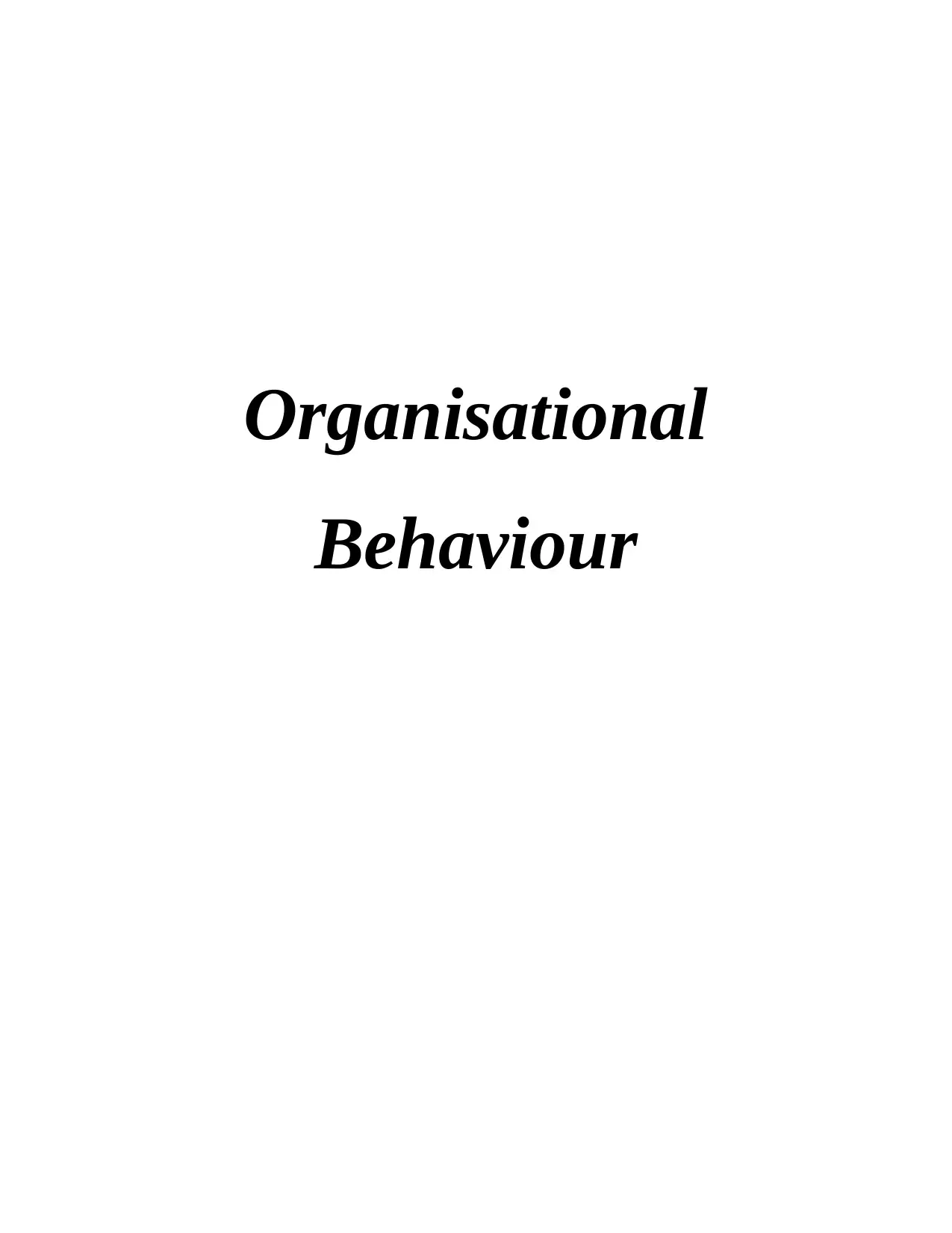
Organisational
Behaviour
Behaviour
Paraphrase This Document
Need a fresh take? Get an instant paraphrase of this document with our AI Paraphraser
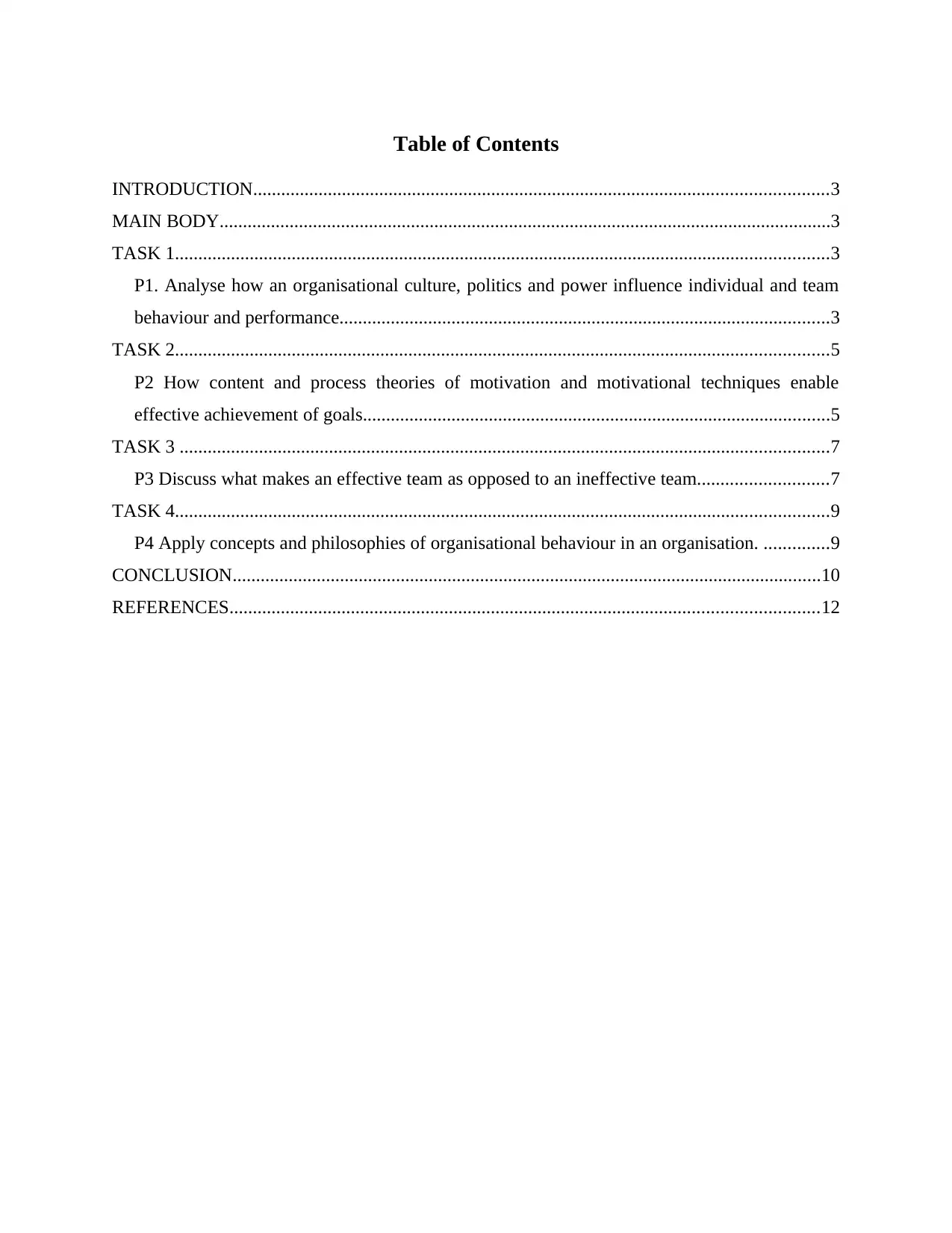
Table of Contents
INTRODUCTION...........................................................................................................................3
MAIN BODY...................................................................................................................................3
TASK 1............................................................................................................................................3
P1. Analyse how an organisational culture, politics and power influence individual and team
behaviour and performance.........................................................................................................3
TASK 2............................................................................................................................................5
P2 How content and process theories of motivation and motivational techniques enable
effective achievement of goals....................................................................................................5
TASK 3 ...........................................................................................................................................7
P3 Discuss what makes an effective team as opposed to an ineffective team............................7
TASK 4............................................................................................................................................9
P4 Apply concepts and philosophies of organisational behaviour in an organisation. ..............9
CONCLUSION..............................................................................................................................10
REFERENCES..............................................................................................................................12
INTRODUCTION...........................................................................................................................3
MAIN BODY...................................................................................................................................3
TASK 1............................................................................................................................................3
P1. Analyse how an organisational culture, politics and power influence individual and team
behaviour and performance.........................................................................................................3
TASK 2............................................................................................................................................5
P2 How content and process theories of motivation and motivational techniques enable
effective achievement of goals....................................................................................................5
TASK 3 ...........................................................................................................................................7
P3 Discuss what makes an effective team as opposed to an ineffective team............................7
TASK 4............................................................................................................................................9
P4 Apply concepts and philosophies of organisational behaviour in an organisation. ..............9
CONCLUSION..............................................................................................................................10
REFERENCES..............................................................................................................................12
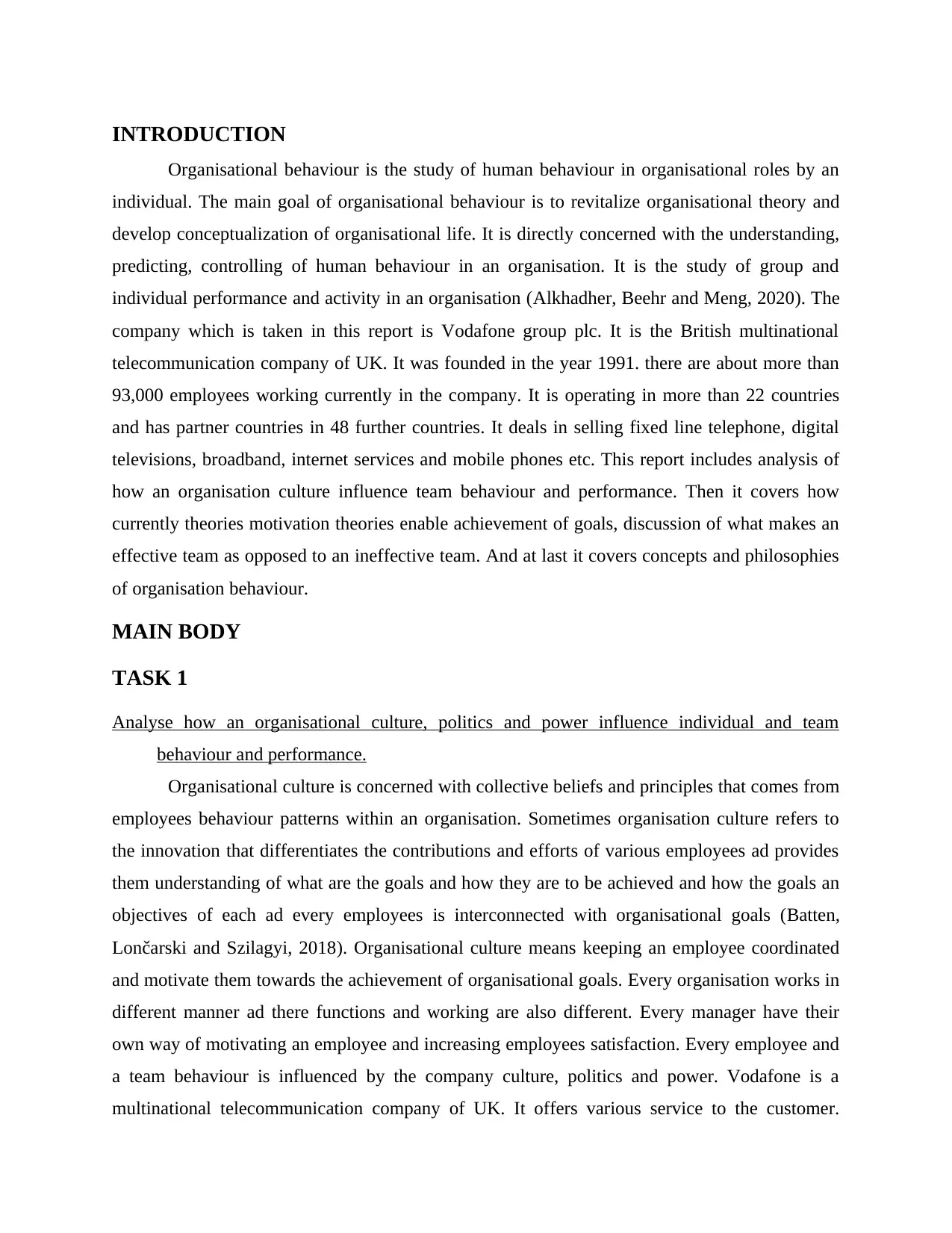
INTRODUCTION
Organisational behaviour is the study of human behaviour in organisational roles by an
individual. The main goal of organisational behaviour is to revitalize organisational theory and
develop conceptualization of organisational life. It is directly concerned with the understanding,
predicting, controlling of human behaviour in an organisation. It is the study of group and
individual performance and activity in an organisation (Alkhadher, Beehr and Meng, 2020). The
company which is taken in this report is Vodafone group plc. It is the British multinational
telecommunication company of UK. It was founded in the year 1991. there are about more than
93,000 employees working currently in the company. It is operating in more than 22 countries
and has partner countries in 48 further countries. It deals in selling fixed line telephone, digital
televisions, broadband, internet services and mobile phones etc. This report includes analysis of
how an organisation culture influence team behaviour and performance. Then it covers how
currently theories motivation theories enable achievement of goals, discussion of what makes an
effective team as opposed to an ineffective team. And at last it covers concepts and philosophies
of organisation behaviour.
MAIN BODY
TASK 1
Analyse how an organisational culture, politics and power influence individual and team
behaviour and performance.
Organisational culture is concerned with collective beliefs and principles that comes from
employees behaviour patterns within an organisation. Sometimes organisation culture refers to
the innovation that differentiates the contributions and efforts of various employees ad provides
them understanding of what are the goals and how they are to be achieved and how the goals an
objectives of each ad every employees is interconnected with organisational goals (Batten,
Lončarski and Szilagyi, 2018). Organisational culture means keeping an employee coordinated
and motivate them towards the achievement of organisational goals. Every organisation works in
different manner ad there functions and working are also different. Every manager have their
own way of motivating an employee and increasing employees satisfaction. Every employee and
a team behaviour is influenced by the company culture, politics and power. Vodafone is a
multinational telecommunication company of UK. It offers various service to the customer.
Organisational behaviour is the study of human behaviour in organisational roles by an
individual. The main goal of organisational behaviour is to revitalize organisational theory and
develop conceptualization of organisational life. It is directly concerned with the understanding,
predicting, controlling of human behaviour in an organisation. It is the study of group and
individual performance and activity in an organisation (Alkhadher, Beehr and Meng, 2020). The
company which is taken in this report is Vodafone group plc. It is the British multinational
telecommunication company of UK. It was founded in the year 1991. there are about more than
93,000 employees working currently in the company. It is operating in more than 22 countries
and has partner countries in 48 further countries. It deals in selling fixed line telephone, digital
televisions, broadband, internet services and mobile phones etc. This report includes analysis of
how an organisation culture influence team behaviour and performance. Then it covers how
currently theories motivation theories enable achievement of goals, discussion of what makes an
effective team as opposed to an ineffective team. And at last it covers concepts and philosophies
of organisation behaviour.
MAIN BODY
TASK 1
Analyse how an organisational culture, politics and power influence individual and team
behaviour and performance.
Organisational culture is concerned with collective beliefs and principles that comes from
employees behaviour patterns within an organisation. Sometimes organisation culture refers to
the innovation that differentiates the contributions and efforts of various employees ad provides
them understanding of what are the goals and how they are to be achieved and how the goals an
objectives of each ad every employees is interconnected with organisational goals (Batten,
Lončarski and Szilagyi, 2018). Organisational culture means keeping an employee coordinated
and motivate them towards the achievement of organisational goals. Every organisation works in
different manner ad there functions and working are also different. Every manager have their
own way of motivating an employee and increasing employees satisfaction. Every employee and
a team behaviour is influenced by the company culture, politics and power. Vodafone is a
multinational telecommunication company of UK. It offers various service to the customer.
⊘ This is a preview!⊘
Do you want full access?
Subscribe today to unlock all pages.

Trusted by 1+ million students worldwide
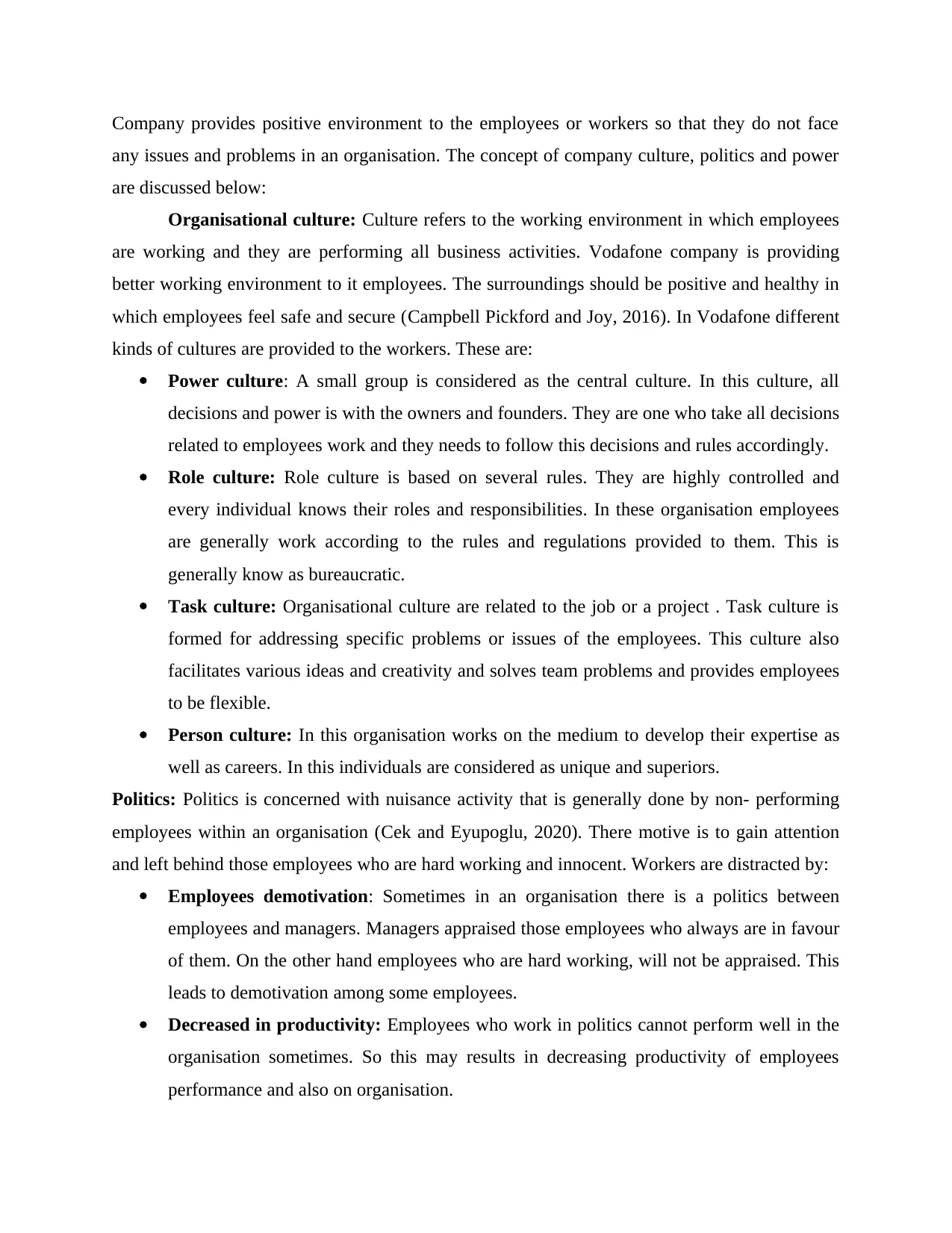
Company provides positive environment to the employees or workers so that they do not face
any issues and problems in an organisation. The concept of company culture, politics and power
are discussed below:
Organisational culture: Culture refers to the working environment in which employees
are working and they are performing all business activities. Vodafone company is providing
better working environment to it employees. The surroundings should be positive and healthy in
which employees feel safe and secure (Campbell Pickford and Joy, 2016). In Vodafone different
kinds of cultures are provided to the workers. These are:
Power culture: A small group is considered as the central culture. In this culture, all
decisions and power is with the owners and founders. They are one who take all decisions
related to employees work and they needs to follow this decisions and rules accordingly.
Role culture: Role culture is based on several rules. They are highly controlled and
every individual knows their roles and responsibilities. In these organisation employees
are generally work according to the rules and regulations provided to them. This is
generally know as bureaucratic.
Task culture: Organisational culture are related to the job or a project . Task culture is
formed for addressing specific problems or issues of the employees. This culture also
facilitates various ideas and creativity and solves team problems and provides employees
to be flexible.
Person culture: In this organisation works on the medium to develop their expertise as
well as careers. In this individuals are considered as unique and superiors.
Politics: Politics is concerned with nuisance activity that is generally done by non- performing
employees within an organisation (Cek and Eyupoglu, 2020). There motive is to gain attention
and left behind those employees who are hard working and innocent. Workers are distracted by:
Employees demotivation: Sometimes in an organisation there is a politics between
employees and managers. Managers appraised those employees who always are in favour
of them. On the other hand employees who are hard working, will not be appraised. This
leads to demotivation among some employees.
Decreased in productivity: Employees who work in politics cannot perform well in the
organisation sometimes. So this may results in decreasing productivity of employees
performance and also on organisation.
any issues and problems in an organisation. The concept of company culture, politics and power
are discussed below:
Organisational culture: Culture refers to the working environment in which employees
are working and they are performing all business activities. Vodafone company is providing
better working environment to it employees. The surroundings should be positive and healthy in
which employees feel safe and secure (Campbell Pickford and Joy, 2016). In Vodafone different
kinds of cultures are provided to the workers. These are:
Power culture: A small group is considered as the central culture. In this culture, all
decisions and power is with the owners and founders. They are one who take all decisions
related to employees work and they needs to follow this decisions and rules accordingly.
Role culture: Role culture is based on several rules. They are highly controlled and
every individual knows their roles and responsibilities. In these organisation employees
are generally work according to the rules and regulations provided to them. This is
generally know as bureaucratic.
Task culture: Organisational culture are related to the job or a project . Task culture is
formed for addressing specific problems or issues of the employees. This culture also
facilitates various ideas and creativity and solves team problems and provides employees
to be flexible.
Person culture: In this organisation works on the medium to develop their expertise as
well as careers. In this individuals are considered as unique and superiors.
Politics: Politics is concerned with nuisance activity that is generally done by non- performing
employees within an organisation (Cek and Eyupoglu, 2020). There motive is to gain attention
and left behind those employees who are hard working and innocent. Workers are distracted by:
Employees demotivation: Sometimes in an organisation there is a politics between
employees and managers. Managers appraised those employees who always are in favour
of them. On the other hand employees who are hard working, will not be appraised. This
leads to demotivation among some employees.
Decreased in productivity: Employees who work in politics cannot perform well in the
organisation sometimes. So this may results in decreasing productivity of employees
performance and also on organisation.
Paraphrase This Document
Need a fresh take? Get an instant paraphrase of this document with our AI Paraphraser
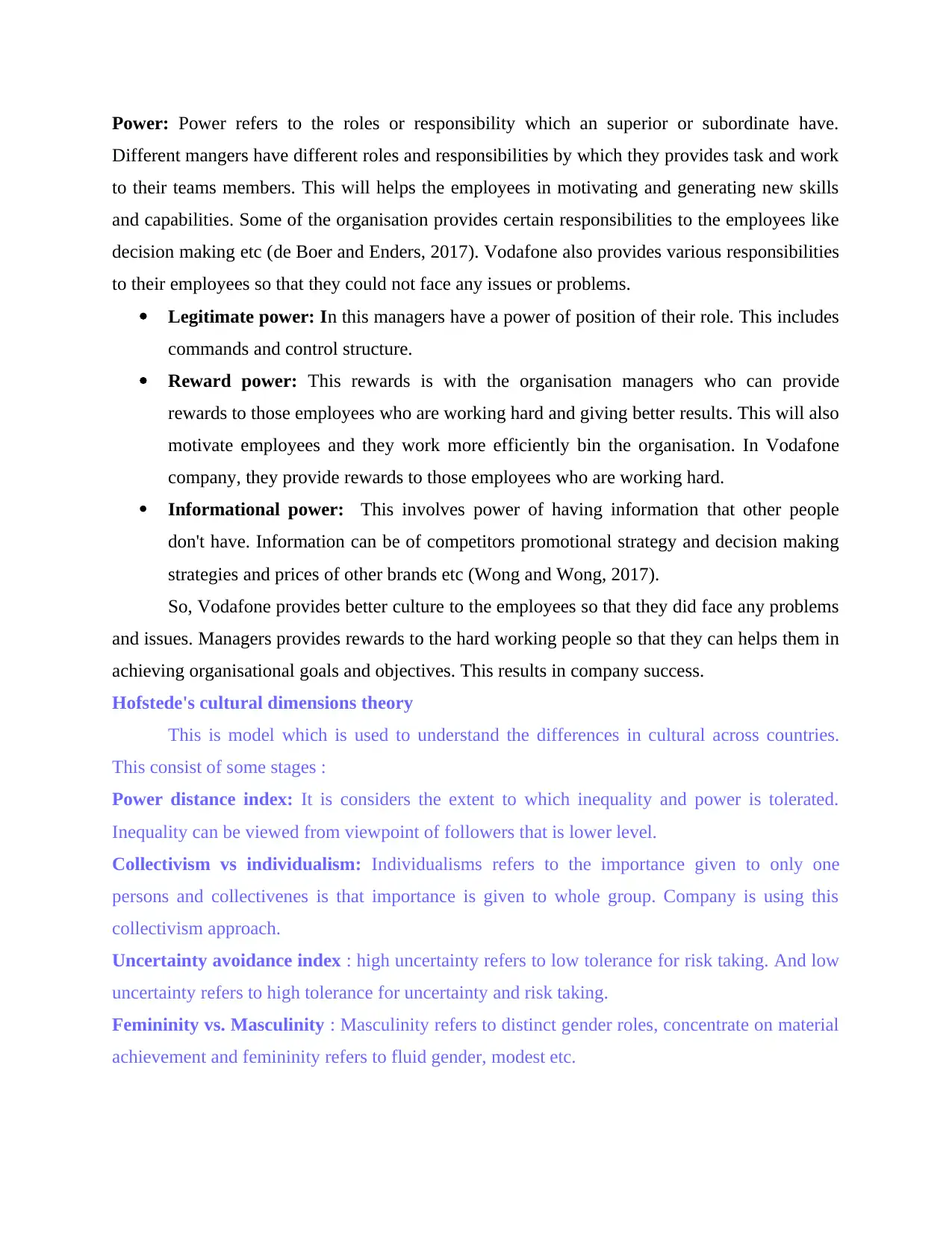
Power: Power refers to the roles or responsibility which an superior or subordinate have.
Different mangers have different roles and responsibilities by which they provides task and work
to their teams members. This will helps the employees in motivating and generating new skills
and capabilities. Some of the organisation provides certain responsibilities to the employees like
decision making etc (de Boer and Enders, 2017). Vodafone also provides various responsibilities
to their employees so that they could not face any issues or problems.
Legitimate power: In this managers have a power of position of their role. This includes
commands and control structure.
Reward power: This rewards is with the organisation managers who can provide
rewards to those employees who are working hard and giving better results. This will also
motivate employees and they work more efficiently bin the organisation. In Vodafone
company, they provide rewards to those employees who are working hard.
Informational power: This involves power of having information that other people
don't have. Information can be of competitors promotional strategy and decision making
strategies and prices of other brands etc (Wong and Wong, 2017).
So, Vodafone provides better culture to the employees so that they did face any problems
and issues. Managers provides rewards to the hard working people so that they can helps them in
achieving organisational goals and objectives. This results in company success.
Hofstede's cultural dimensions theory
This is model which is used to understand the differences in cultural across countries.
This consist of some stages :
Power distance index: It is considers the extent to which inequality and power is tolerated.
Inequality can be viewed from viewpoint of followers that is lower level.
Collectivism vs individualism: Individualisms refers to the importance given to only one
persons and collectivenes is that importance is given to whole group. Company is using this
collectivism approach.
Uncertainty avoidance index : high uncertainty refers to low tolerance for risk taking. And low
uncertainty refers to high tolerance for uncertainty and risk taking.
Femininity vs. Masculinity : Masculinity refers to distinct gender roles, concentrate on material
achievement and femininity refers to fluid gender, modest etc.
Different mangers have different roles and responsibilities by which they provides task and work
to their teams members. This will helps the employees in motivating and generating new skills
and capabilities. Some of the organisation provides certain responsibilities to the employees like
decision making etc (de Boer and Enders, 2017). Vodafone also provides various responsibilities
to their employees so that they could not face any issues or problems.
Legitimate power: In this managers have a power of position of their role. This includes
commands and control structure.
Reward power: This rewards is with the organisation managers who can provide
rewards to those employees who are working hard and giving better results. This will also
motivate employees and they work more efficiently bin the organisation. In Vodafone
company, they provide rewards to those employees who are working hard.
Informational power: This involves power of having information that other people
don't have. Information can be of competitors promotional strategy and decision making
strategies and prices of other brands etc (Wong and Wong, 2017).
So, Vodafone provides better culture to the employees so that they did face any problems
and issues. Managers provides rewards to the hard working people so that they can helps them in
achieving organisational goals and objectives. This results in company success.
Hofstede's cultural dimensions theory
This is model which is used to understand the differences in cultural across countries.
This consist of some stages :
Power distance index: It is considers the extent to which inequality and power is tolerated.
Inequality can be viewed from viewpoint of followers that is lower level.
Collectivism vs individualism: Individualisms refers to the importance given to only one
persons and collectivenes is that importance is given to whole group. Company is using this
collectivism approach.
Uncertainty avoidance index : high uncertainty refers to low tolerance for risk taking. And low
uncertainty refers to high tolerance for uncertainty and risk taking.
Femininity vs. Masculinity : Masculinity refers to distinct gender roles, concentrate on material
achievement and femininity refers to fluid gender, modest etc.
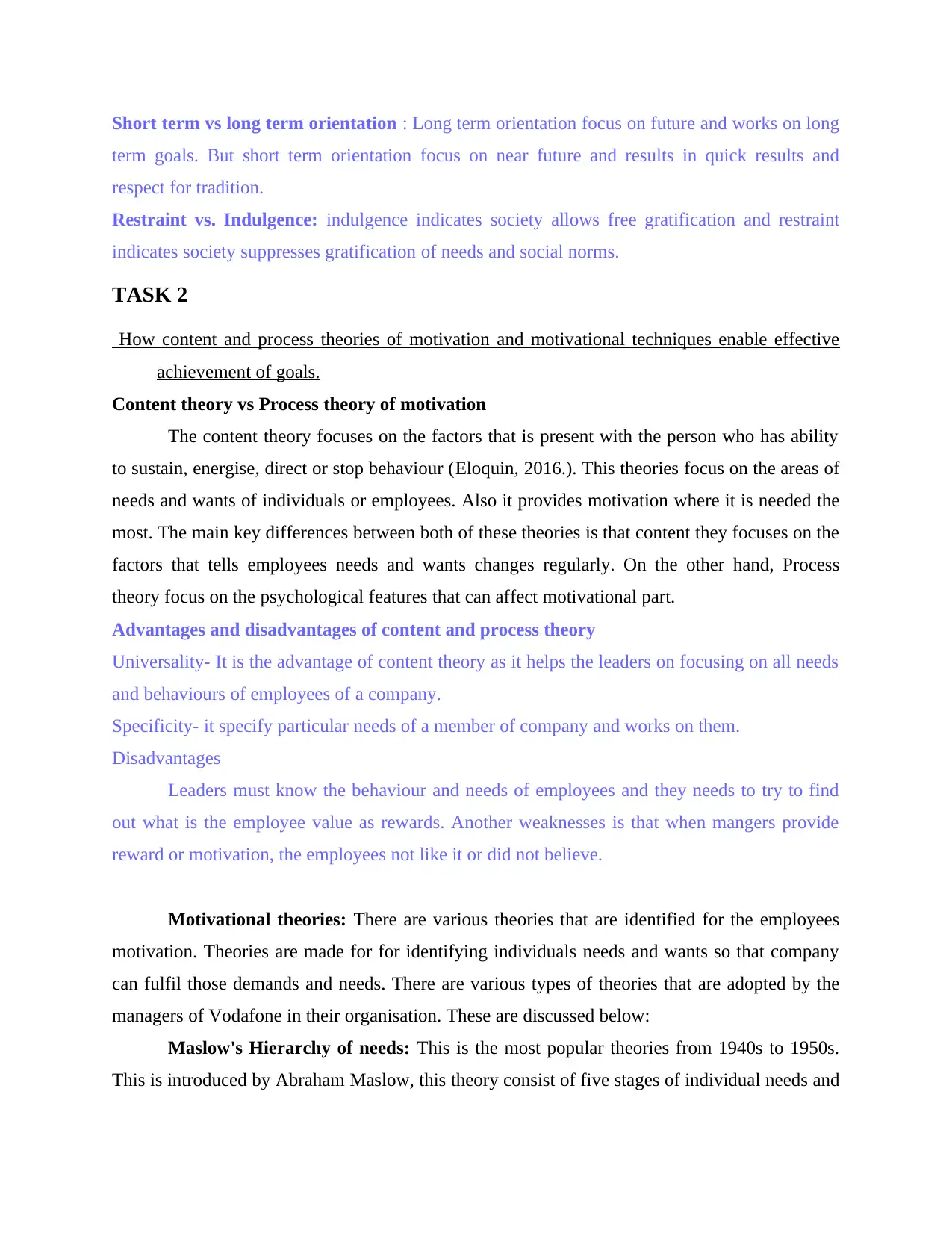
Short term vs long term orientation : Long term orientation focus on future and works on long
term goals. But short term orientation focus on near future and results in quick results and
respect for tradition.
Restraint vs. Indulgence: indulgence indicates society allows free gratification and restraint
indicates society suppresses gratification of needs and social norms.
TASK 2
How content and process theories of motivation and motivational techniques enable effective
achievement of goals.
Content theory vs Process theory of motivation
The content theory focuses on the factors that is present with the person who has ability
to sustain, energise, direct or stop behaviour (Eloquin, 2016.). This theories focus on the areas of
needs and wants of individuals or employees. Also it provides motivation where it is needed the
most. The main key differences between both of these theories is that content they focuses on the
factors that tells employees needs and wants changes regularly. On the other hand, Process
theory focus on the psychological features that can affect motivational part.
Advantages and disadvantages of content and process theory
Universality- It is the advantage of content theory as it helps the leaders on focusing on all needs
and behaviours of employees of a company.
Specificity- it specify particular needs of a member of company and works on them.
Disadvantages
Leaders must know the behaviour and needs of employees and they needs to try to find
out what is the employee value as rewards. Another weaknesses is that when mangers provide
reward or motivation, the employees not like it or did not believe.
Motivational theories: There are various theories that are identified for the employees
motivation. Theories are made for for identifying individuals needs and wants so that company
can fulfil those demands and needs. There are various types of theories that are adopted by the
managers of Vodafone in their organisation. These are discussed below:
Maslow's Hierarchy of needs: This is the most popular theories from 1940s to 1950s.
This is introduced by Abraham Maslow, this theory consist of five stages of individual needs and
term goals. But short term orientation focus on near future and results in quick results and
respect for tradition.
Restraint vs. Indulgence: indulgence indicates society allows free gratification and restraint
indicates society suppresses gratification of needs and social norms.
TASK 2
How content and process theories of motivation and motivational techniques enable effective
achievement of goals.
Content theory vs Process theory of motivation
The content theory focuses on the factors that is present with the person who has ability
to sustain, energise, direct or stop behaviour (Eloquin, 2016.). This theories focus on the areas of
needs and wants of individuals or employees. Also it provides motivation where it is needed the
most. The main key differences between both of these theories is that content they focuses on the
factors that tells employees needs and wants changes regularly. On the other hand, Process
theory focus on the psychological features that can affect motivational part.
Advantages and disadvantages of content and process theory
Universality- It is the advantage of content theory as it helps the leaders on focusing on all needs
and behaviours of employees of a company.
Specificity- it specify particular needs of a member of company and works on them.
Disadvantages
Leaders must know the behaviour and needs of employees and they needs to try to find
out what is the employee value as rewards. Another weaknesses is that when mangers provide
reward or motivation, the employees not like it or did not believe.
Motivational theories: There are various theories that are identified for the employees
motivation. Theories are made for for identifying individuals needs and wants so that company
can fulfil those demands and needs. There are various types of theories that are adopted by the
managers of Vodafone in their organisation. These are discussed below:
Maslow's Hierarchy of needs: This is the most popular theories from 1940s to 1950s.
This is introduced by Abraham Maslow, this theory consist of five stages of individual needs and
⊘ This is a preview!⊘
Do you want full access?
Subscribe today to unlock all pages.

Trusted by 1+ million students worldwide
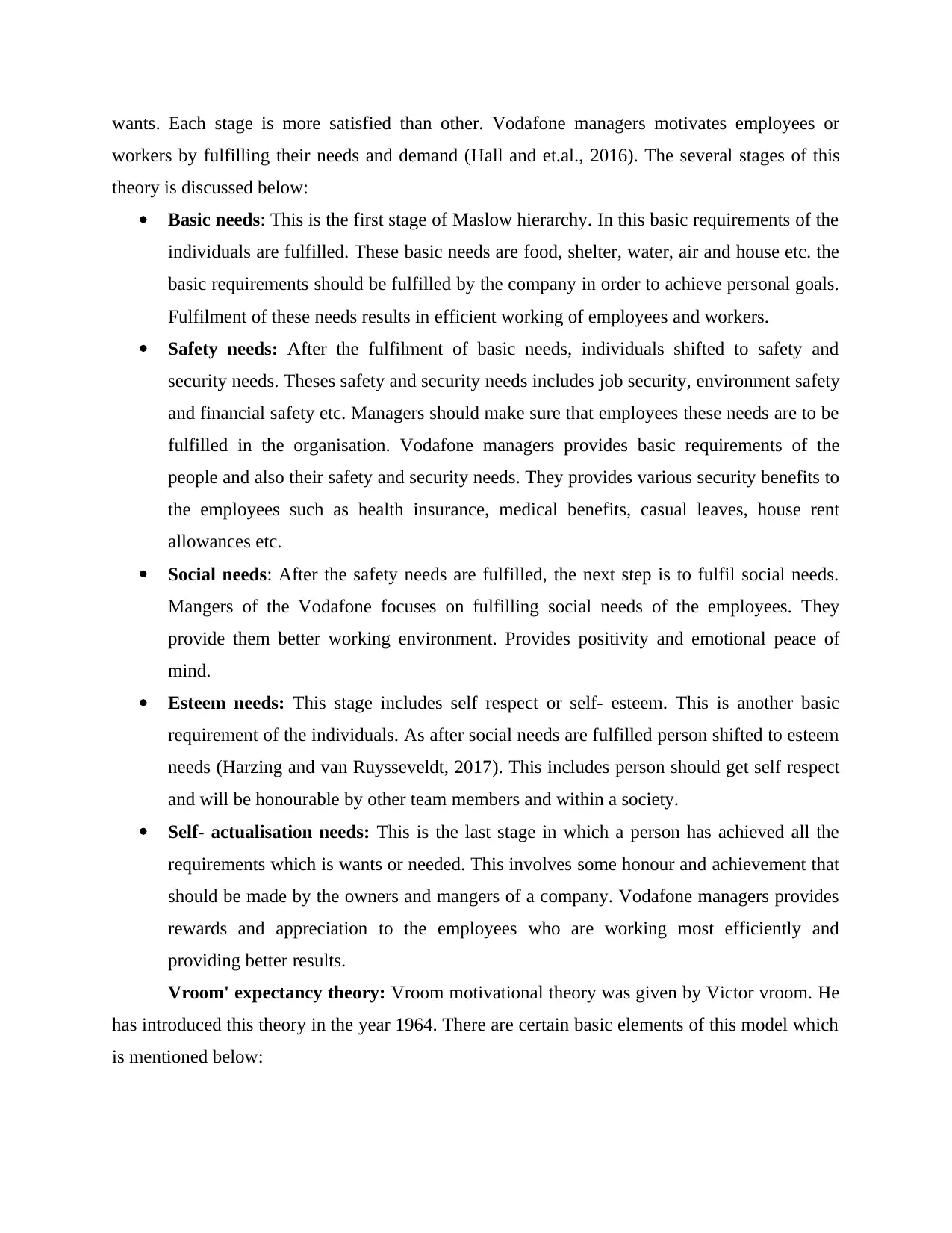
wants. Each stage is more satisfied than other. Vodafone managers motivates employees or
workers by fulfilling their needs and demand (Hall and et.al., 2016). The several stages of this
theory is discussed below:
Basic needs: This is the first stage of Maslow hierarchy. In this basic requirements of the
individuals are fulfilled. These basic needs are food, shelter, water, air and house etc. the
basic requirements should be fulfilled by the company in order to achieve personal goals.
Fulfilment of these needs results in efficient working of employees and workers.
Safety needs: After the fulfilment of basic needs, individuals shifted to safety and
security needs. Theses safety and security needs includes job security, environment safety
and financial safety etc. Managers should make sure that employees these needs are to be
fulfilled in the organisation. Vodafone managers provides basic requirements of the
people and also their safety and security needs. They provides various security benefits to
the employees such as health insurance, medical benefits, casual leaves, house rent
allowances etc.
Social needs: After the safety needs are fulfilled, the next step is to fulfil social needs.
Mangers of the Vodafone focuses on fulfilling social needs of the employees. They
provide them better working environment. Provides positivity and emotional peace of
mind.
Esteem needs: This stage includes self respect or self- esteem. This is another basic
requirement of the individuals. As after social needs are fulfilled person shifted to esteem
needs (Harzing and van Ruysseveldt, 2017). This includes person should get self respect
and will be honourable by other team members and within a society.
Self- actualisation needs: This is the last stage in which a person has achieved all the
requirements which is wants or needed. This involves some honour and achievement that
should be made by the owners and mangers of a company. Vodafone managers provides
rewards and appreciation to the employees who are working most efficiently and
providing better results.
Vroom' expectancy theory: Vroom motivational theory was given by Victor vroom. He
has introduced this theory in the year 1964. There are certain basic elements of this model which
is mentioned below:
workers by fulfilling their needs and demand (Hall and et.al., 2016). The several stages of this
theory is discussed below:
Basic needs: This is the first stage of Maslow hierarchy. In this basic requirements of the
individuals are fulfilled. These basic needs are food, shelter, water, air and house etc. the
basic requirements should be fulfilled by the company in order to achieve personal goals.
Fulfilment of these needs results in efficient working of employees and workers.
Safety needs: After the fulfilment of basic needs, individuals shifted to safety and
security needs. Theses safety and security needs includes job security, environment safety
and financial safety etc. Managers should make sure that employees these needs are to be
fulfilled in the organisation. Vodafone managers provides basic requirements of the
people and also their safety and security needs. They provides various security benefits to
the employees such as health insurance, medical benefits, casual leaves, house rent
allowances etc.
Social needs: After the safety needs are fulfilled, the next step is to fulfil social needs.
Mangers of the Vodafone focuses on fulfilling social needs of the employees. They
provide them better working environment. Provides positivity and emotional peace of
mind.
Esteem needs: This stage includes self respect or self- esteem. This is another basic
requirement of the individuals. As after social needs are fulfilled person shifted to esteem
needs (Harzing and van Ruysseveldt, 2017). This includes person should get self respect
and will be honourable by other team members and within a society.
Self- actualisation needs: This is the last stage in which a person has achieved all the
requirements which is wants or needed. This involves some honour and achievement that
should be made by the owners and mangers of a company. Vodafone managers provides
rewards and appreciation to the employees who are working most efficiently and
providing better results.
Vroom' expectancy theory: Vroom motivational theory was given by Victor vroom. He
has introduced this theory in the year 1964. There are certain basic elements of this model which
is mentioned below:
Paraphrase This Document
Need a fresh take? Get an instant paraphrase of this document with our AI Paraphraser
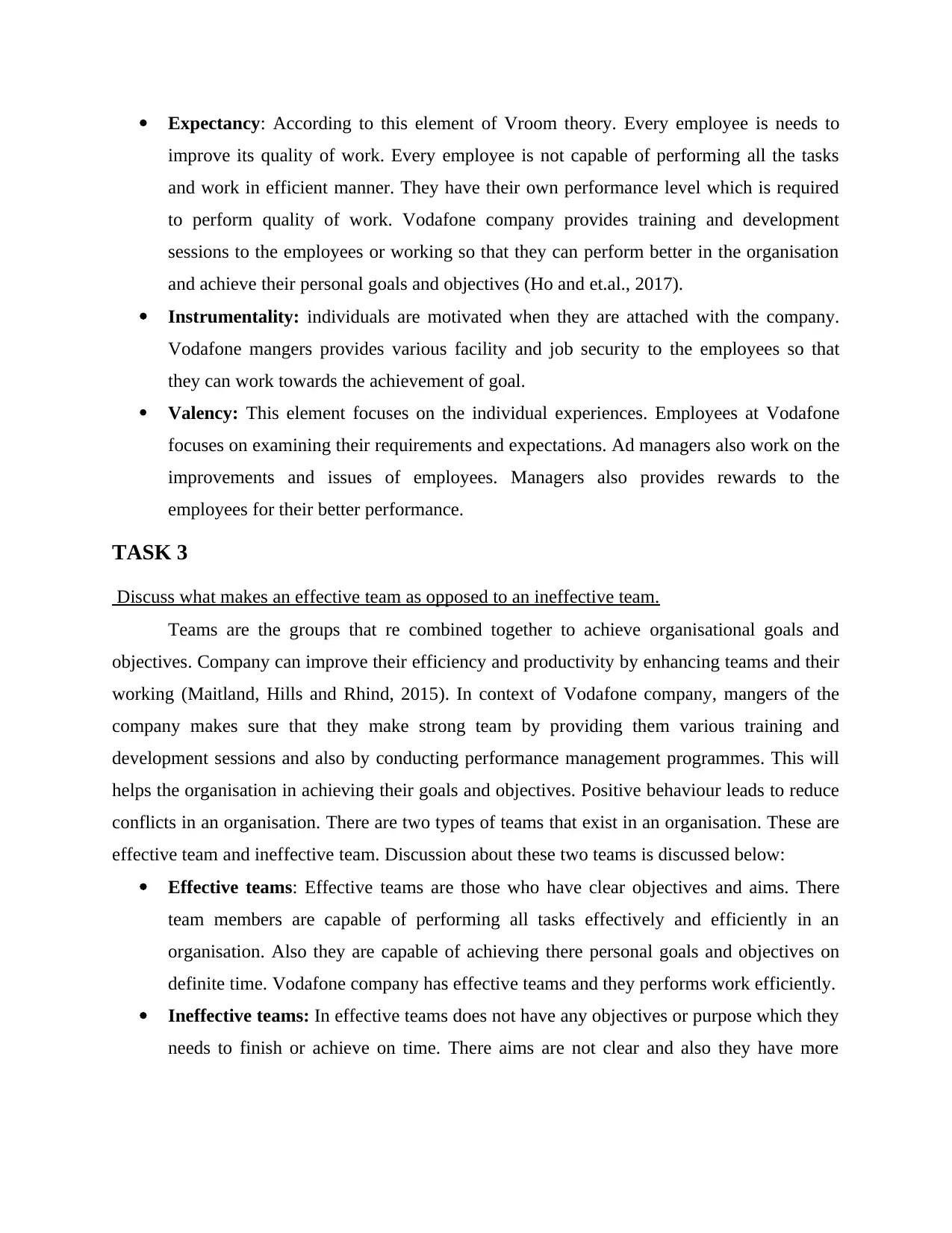
Expectancy: According to this element of Vroom theory. Every employee is needs to
improve its quality of work. Every employee is not capable of performing all the tasks
and work in efficient manner. They have their own performance level which is required
to perform quality of work. Vodafone company provides training and development
sessions to the employees or working so that they can perform better in the organisation
and achieve their personal goals and objectives (Ho and et.al., 2017).
Instrumentality: individuals are motivated when they are attached with the company.
Vodafone mangers provides various facility and job security to the employees so that
they can work towards the achievement of goal.
Valency: This element focuses on the individual experiences. Employees at Vodafone
focuses on examining their requirements and expectations. Ad managers also work on the
improvements and issues of employees. Managers also provides rewards to the
employees for their better performance.
TASK 3
Discuss what makes an effective team as opposed to an ineffective team.
Teams are the groups that re combined together to achieve organisational goals and
objectives. Company can improve their efficiency and productivity by enhancing teams and their
working (Maitland, Hills and Rhind, 2015). In context of Vodafone company, mangers of the
company makes sure that they make strong team by providing them various training and
development sessions and also by conducting performance management programmes. This will
helps the organisation in achieving their goals and objectives. Positive behaviour leads to reduce
conflicts in an organisation. There are two types of teams that exist in an organisation. These are
effective team and ineffective team. Discussion about these two teams is discussed below:
Effective teams: Effective teams are those who have clear objectives and aims. There
team members are capable of performing all tasks effectively and efficiently in an
organisation. Also they are capable of achieving there personal goals and objectives on
definite time. Vodafone company has effective teams and they performs work efficiently.
Ineffective teams: In effective teams does not have any objectives or purpose which they
needs to finish or achieve on time. There aims are not clear and also they have more
improve its quality of work. Every employee is not capable of performing all the tasks
and work in efficient manner. They have their own performance level which is required
to perform quality of work. Vodafone company provides training and development
sessions to the employees or working so that they can perform better in the organisation
and achieve their personal goals and objectives (Ho and et.al., 2017).
Instrumentality: individuals are motivated when they are attached with the company.
Vodafone mangers provides various facility and job security to the employees so that
they can work towards the achievement of goal.
Valency: This element focuses on the individual experiences. Employees at Vodafone
focuses on examining their requirements and expectations. Ad managers also work on the
improvements and issues of employees. Managers also provides rewards to the
employees for their better performance.
TASK 3
Discuss what makes an effective team as opposed to an ineffective team.
Teams are the groups that re combined together to achieve organisational goals and
objectives. Company can improve their efficiency and productivity by enhancing teams and their
working (Maitland, Hills and Rhind, 2015). In context of Vodafone company, mangers of the
company makes sure that they make strong team by providing them various training and
development sessions and also by conducting performance management programmes. This will
helps the organisation in achieving their goals and objectives. Positive behaviour leads to reduce
conflicts in an organisation. There are two types of teams that exist in an organisation. These are
effective team and ineffective team. Discussion about these two teams is discussed below:
Effective teams: Effective teams are those who have clear objectives and aims. There
team members are capable of performing all tasks effectively and efficiently in an
organisation. Also they are capable of achieving there personal goals and objectives on
definite time. Vodafone company has effective teams and they performs work efficiently.
Ineffective teams: In effective teams does not have any objectives or purpose which they
needs to finish or achieve on time. There aims are not clear and also they have more
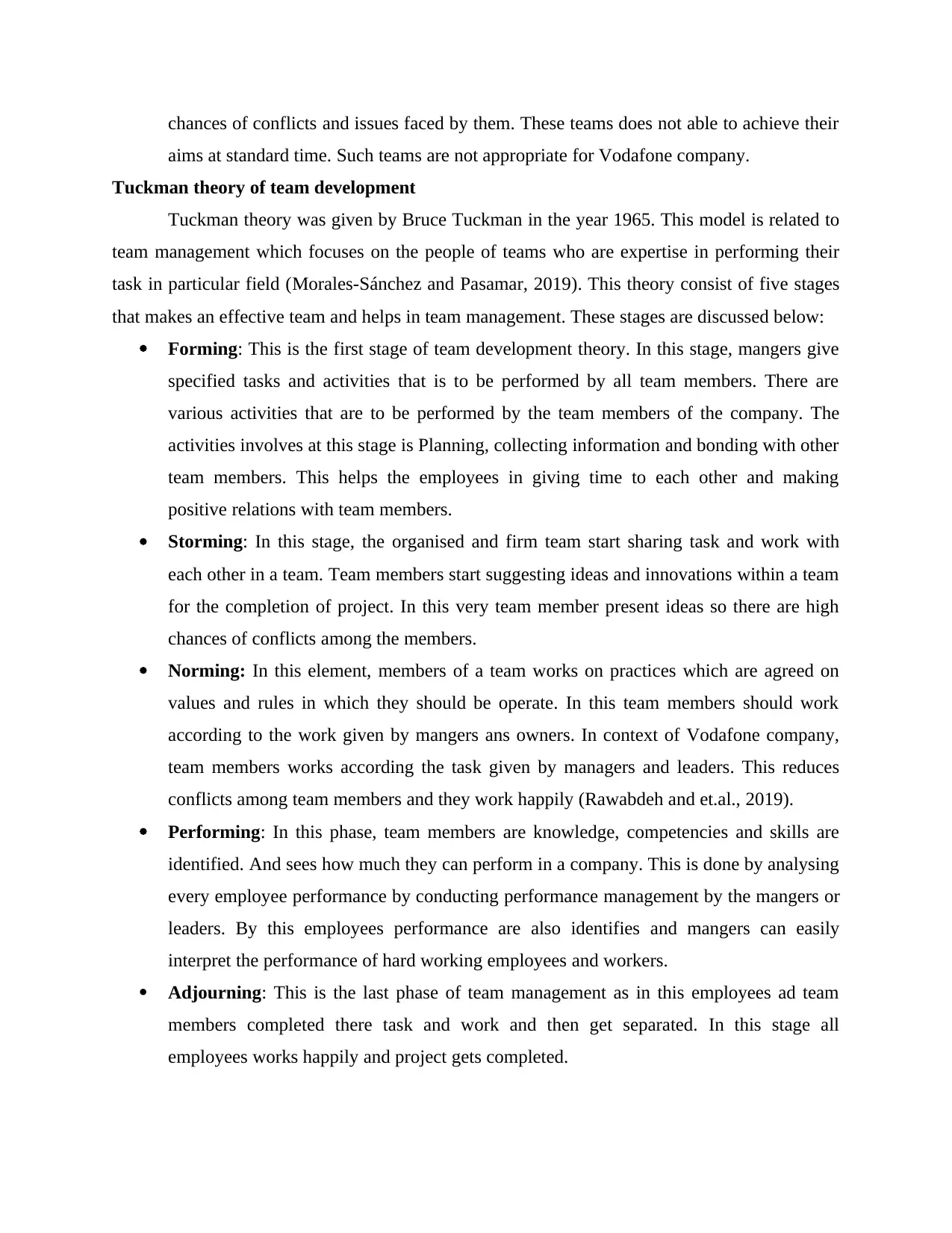
chances of conflicts and issues faced by them. These teams does not able to achieve their
aims at standard time. Such teams are not appropriate for Vodafone company.
Tuckman theory of team development
Tuckman theory was given by Bruce Tuckman in the year 1965. This model is related to
team management which focuses on the people of teams who are expertise in performing their
task in particular field (Morales-Sánchez and Pasamar, 2019). This theory consist of five stages
that makes an effective team and helps in team management. These stages are discussed below:
Forming: This is the first stage of team development theory. In this stage, mangers give
specified tasks and activities that is to be performed by all team members. There are
various activities that are to be performed by the team members of the company. The
activities involves at this stage is Planning, collecting information and bonding with other
team members. This helps the employees in giving time to each other and making
positive relations with team members.
Storming: In this stage, the organised and firm team start sharing task and work with
each other in a team. Team members start suggesting ideas and innovations within a team
for the completion of project. In this very team member present ideas so there are high
chances of conflicts among the members.
Norming: In this element, members of a team works on practices which are agreed on
values and rules in which they should be operate. In this team members should work
according to the work given by mangers ans owners. In context of Vodafone company,
team members works according the task given by managers and leaders. This reduces
conflicts among team members and they work happily (Rawabdeh and et.al., 2019).
Performing: In this phase, team members are knowledge, competencies and skills are
identified. And sees how much they can perform in a company. This is done by analysing
every employee performance by conducting performance management by the mangers or
leaders. By this employees performance are also identifies and mangers can easily
interpret the performance of hard working employees and workers.
Adjourning: This is the last phase of team management as in this employees ad team
members completed there task and work and then get separated. In this stage all
employees works happily and project gets completed.
aims at standard time. Such teams are not appropriate for Vodafone company.
Tuckman theory of team development
Tuckman theory was given by Bruce Tuckman in the year 1965. This model is related to
team management which focuses on the people of teams who are expertise in performing their
task in particular field (Morales-Sánchez and Pasamar, 2019). This theory consist of five stages
that makes an effective team and helps in team management. These stages are discussed below:
Forming: This is the first stage of team development theory. In this stage, mangers give
specified tasks and activities that is to be performed by all team members. There are
various activities that are to be performed by the team members of the company. The
activities involves at this stage is Planning, collecting information and bonding with other
team members. This helps the employees in giving time to each other and making
positive relations with team members.
Storming: In this stage, the organised and firm team start sharing task and work with
each other in a team. Team members start suggesting ideas and innovations within a team
for the completion of project. In this very team member present ideas so there are high
chances of conflicts among the members.
Norming: In this element, members of a team works on practices which are agreed on
values and rules in which they should be operate. In this team members should work
according to the work given by mangers ans owners. In context of Vodafone company,
team members works according the task given by managers and leaders. This reduces
conflicts among team members and they work happily (Rawabdeh and et.al., 2019).
Performing: In this phase, team members are knowledge, competencies and skills are
identified. And sees how much they can perform in a company. This is done by analysing
every employee performance by conducting performance management by the mangers or
leaders. By this employees performance are also identifies and mangers can easily
interpret the performance of hard working employees and workers.
Adjourning: This is the last phase of team management as in this employees ad team
members completed there task and work and then get separated. In this stage all
employees works happily and project gets completed.
⊘ This is a preview!⊘
Do you want full access?
Subscribe today to unlock all pages.

Trusted by 1+ million students worldwide
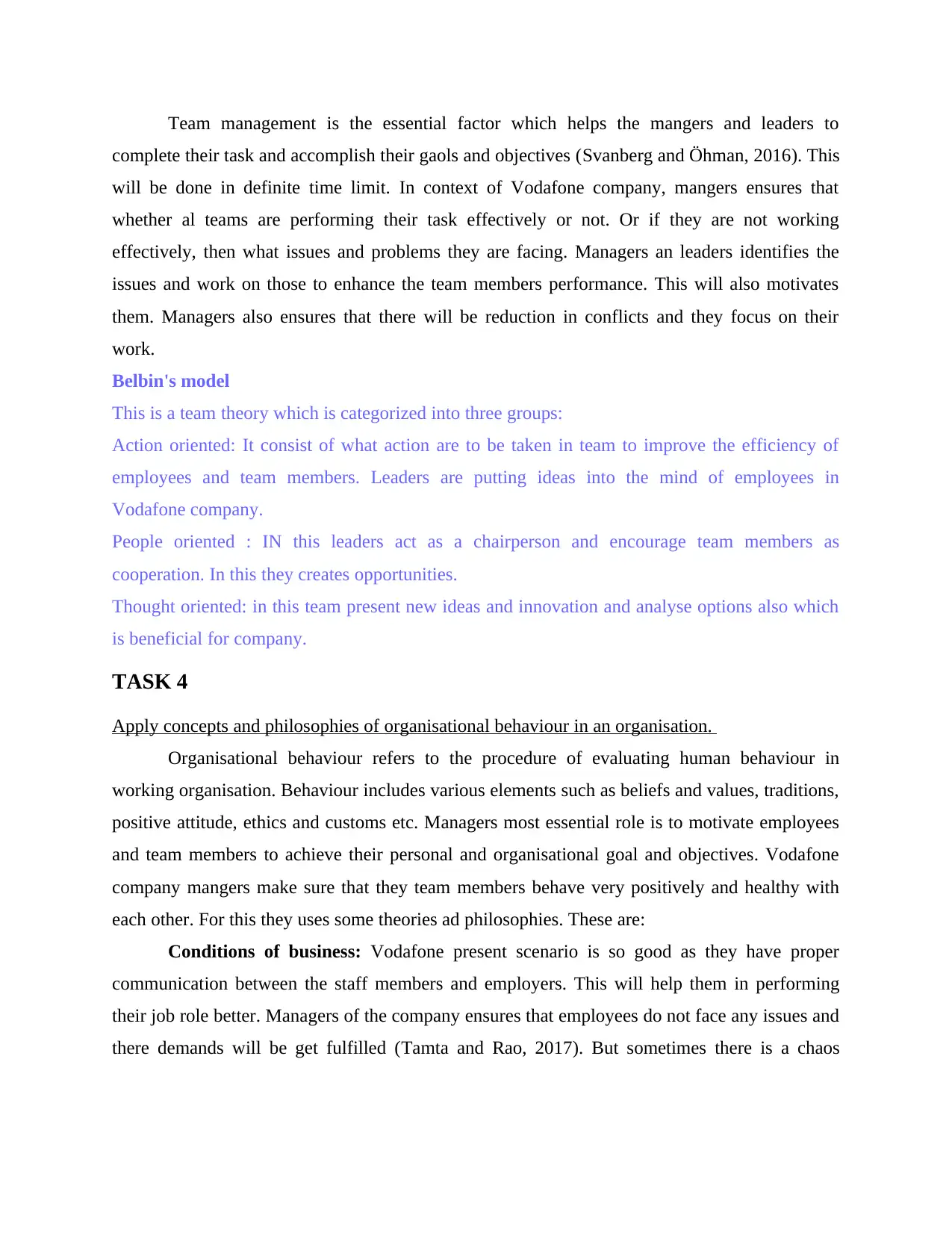
Team management is the essential factor which helps the mangers and leaders to
complete their task and accomplish their gaols and objectives (Svanberg and Öhman, 2016). This
will be done in definite time limit. In context of Vodafone company, mangers ensures that
whether al teams are performing their task effectively or not. Or if they are not working
effectively, then what issues and problems they are facing. Managers an leaders identifies the
issues and work on those to enhance the team members performance. This will also motivates
them. Managers also ensures that there will be reduction in conflicts and they focus on their
work.
Belbin's model
This is a team theory which is categorized into three groups:
Action oriented: It consist of what action are to be taken in team to improve the efficiency of
employees and team members. Leaders are putting ideas into the mind of employees in
Vodafone company.
People oriented : IN this leaders act as a chairperson and encourage team members as
cooperation. In this they creates opportunities.
Thought oriented: in this team present new ideas and innovation and analyse options also which
is beneficial for company.
TASK 4
Apply concepts and philosophies of organisational behaviour in an organisation.
Organisational behaviour refers to the procedure of evaluating human behaviour in
working organisation. Behaviour includes various elements such as beliefs and values, traditions,
positive attitude, ethics and customs etc. Managers most essential role is to motivate employees
and team members to achieve their personal and organisational goal and objectives. Vodafone
company mangers make sure that they team members behave very positively and healthy with
each other. For this they uses some theories ad philosophies. These are:
Conditions of business: Vodafone present scenario is so good as they have proper
communication between the staff members and employers. This will help them in performing
their job role better. Managers of the company ensures that employees do not face any issues and
there demands will be get fulfilled (Tamta and Rao, 2017). But sometimes there is a chaos
complete their task and accomplish their gaols and objectives (Svanberg and Öhman, 2016). This
will be done in definite time limit. In context of Vodafone company, mangers ensures that
whether al teams are performing their task effectively or not. Or if they are not working
effectively, then what issues and problems they are facing. Managers an leaders identifies the
issues and work on those to enhance the team members performance. This will also motivates
them. Managers also ensures that there will be reduction in conflicts and they focus on their
work.
Belbin's model
This is a team theory which is categorized into three groups:
Action oriented: It consist of what action are to be taken in team to improve the efficiency of
employees and team members. Leaders are putting ideas into the mind of employees in
Vodafone company.
People oriented : IN this leaders act as a chairperson and encourage team members as
cooperation. In this they creates opportunities.
Thought oriented: in this team present new ideas and innovation and analyse options also which
is beneficial for company.
TASK 4
Apply concepts and philosophies of organisational behaviour in an organisation.
Organisational behaviour refers to the procedure of evaluating human behaviour in
working organisation. Behaviour includes various elements such as beliefs and values, traditions,
positive attitude, ethics and customs etc. Managers most essential role is to motivate employees
and team members to achieve their personal and organisational goal and objectives. Vodafone
company mangers make sure that they team members behave very positively and healthy with
each other. For this they uses some theories ad philosophies. These are:
Conditions of business: Vodafone present scenario is so good as they have proper
communication between the staff members and employers. This will help them in performing
their job role better. Managers of the company ensures that employees do not face any issues and
there demands will be get fulfilled (Tamta and Rao, 2017). But sometimes there is a chaos
Paraphrase This Document
Need a fresh take? Get an instant paraphrase of this document with our AI Paraphraser
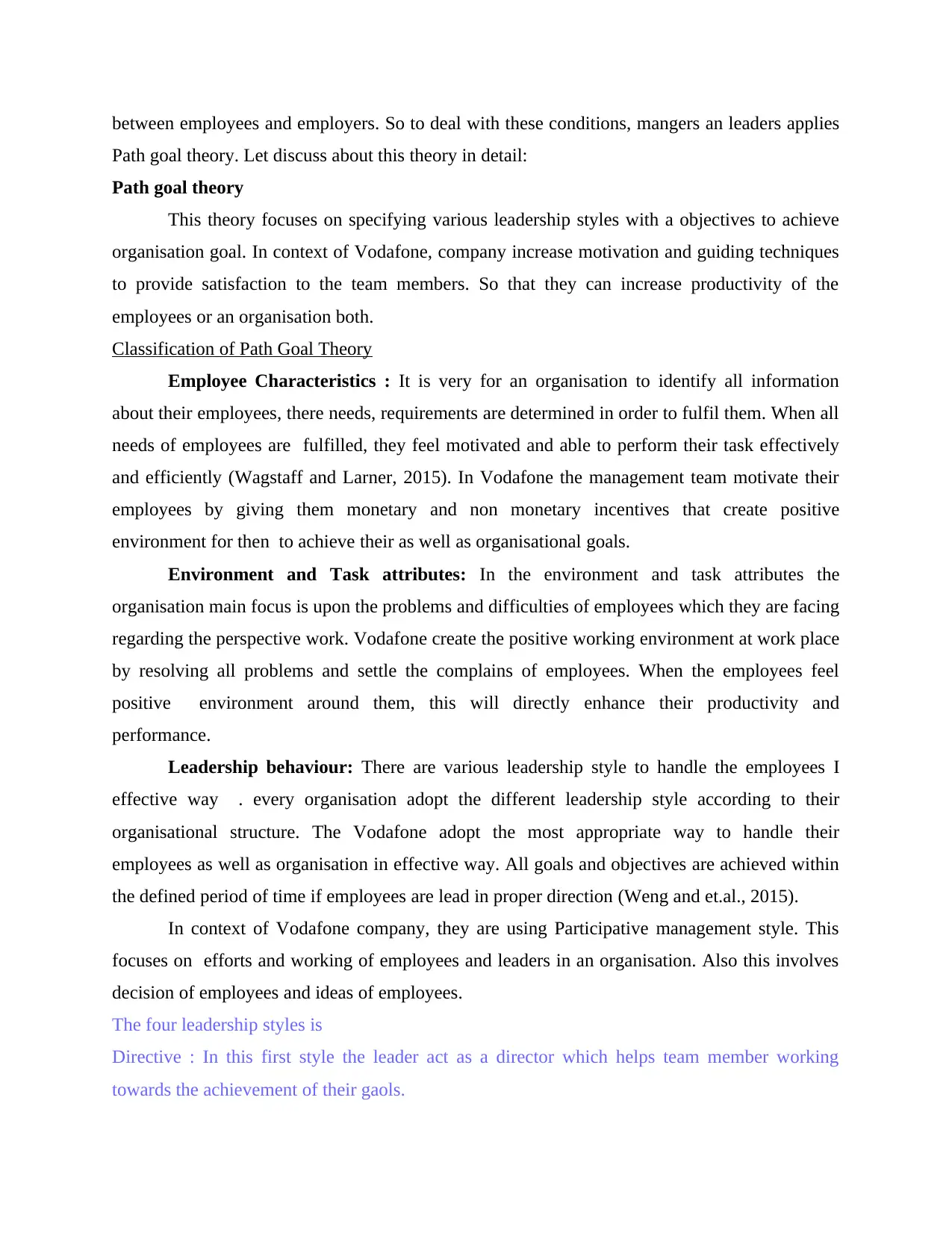
between employees and employers. So to deal with these conditions, mangers an leaders applies
Path goal theory. Let discuss about this theory in detail:
Path goal theory
This theory focuses on specifying various leadership styles with a objectives to achieve
organisation goal. In context of Vodafone, company increase motivation and guiding techniques
to provide satisfaction to the team members. So that they can increase productivity of the
employees or an organisation both.
Classification of Path Goal Theory
Employee Characteristics : It is very for an organisation to identify all information
about their employees, there needs, requirements are determined in order to fulfil them. When all
needs of employees are fulfilled, they feel motivated and able to perform their task effectively
and efficiently (Wagstaff and Larner, 2015). In Vodafone the management team motivate their
employees by giving them monetary and non monetary incentives that create positive
environment for then to achieve their as well as organisational goals.
Environment and Task attributes: In the environment and task attributes the
organisation main focus is upon the problems and difficulties of employees which they are facing
regarding the perspective work. Vodafone create the positive working environment at work place
by resolving all problems and settle the complains of employees. When the employees feel
positive environment around them, this will directly enhance their productivity and
performance.
Leadership behaviour: There are various leadership style to handle the employees I
effective way . every organisation adopt the different leadership style according to their
organisational structure. The Vodafone adopt the most appropriate way to handle their
employees as well as organisation in effective way. All goals and objectives are achieved within
the defined period of time if employees are lead in proper direction (Weng and et.al., 2015).
In context of Vodafone company, they are using Participative management style. This
focuses on efforts and working of employees and leaders in an organisation. Also this involves
decision of employees and ideas of employees.
The four leadership styles is
Directive : In this first style the leader act as a director which helps team member working
towards the achievement of their gaols.
Path goal theory. Let discuss about this theory in detail:
Path goal theory
This theory focuses on specifying various leadership styles with a objectives to achieve
organisation goal. In context of Vodafone, company increase motivation and guiding techniques
to provide satisfaction to the team members. So that they can increase productivity of the
employees or an organisation both.
Classification of Path Goal Theory
Employee Characteristics : It is very for an organisation to identify all information
about their employees, there needs, requirements are determined in order to fulfil them. When all
needs of employees are fulfilled, they feel motivated and able to perform their task effectively
and efficiently (Wagstaff and Larner, 2015). In Vodafone the management team motivate their
employees by giving them monetary and non monetary incentives that create positive
environment for then to achieve their as well as organisational goals.
Environment and Task attributes: In the environment and task attributes the
organisation main focus is upon the problems and difficulties of employees which they are facing
regarding the perspective work. Vodafone create the positive working environment at work place
by resolving all problems and settle the complains of employees. When the employees feel
positive environment around them, this will directly enhance their productivity and
performance.
Leadership behaviour: There are various leadership style to handle the employees I
effective way . every organisation adopt the different leadership style according to their
organisational structure. The Vodafone adopt the most appropriate way to handle their
employees as well as organisation in effective way. All goals and objectives are achieved within
the defined period of time if employees are lead in proper direction (Weng and et.al., 2015).
In context of Vodafone company, they are using Participative management style. This
focuses on efforts and working of employees and leaders in an organisation. Also this involves
decision of employees and ideas of employees.
The four leadership styles is
Directive : In this first style the leader act as a director which helps team member working
towards the achievement of their gaols.
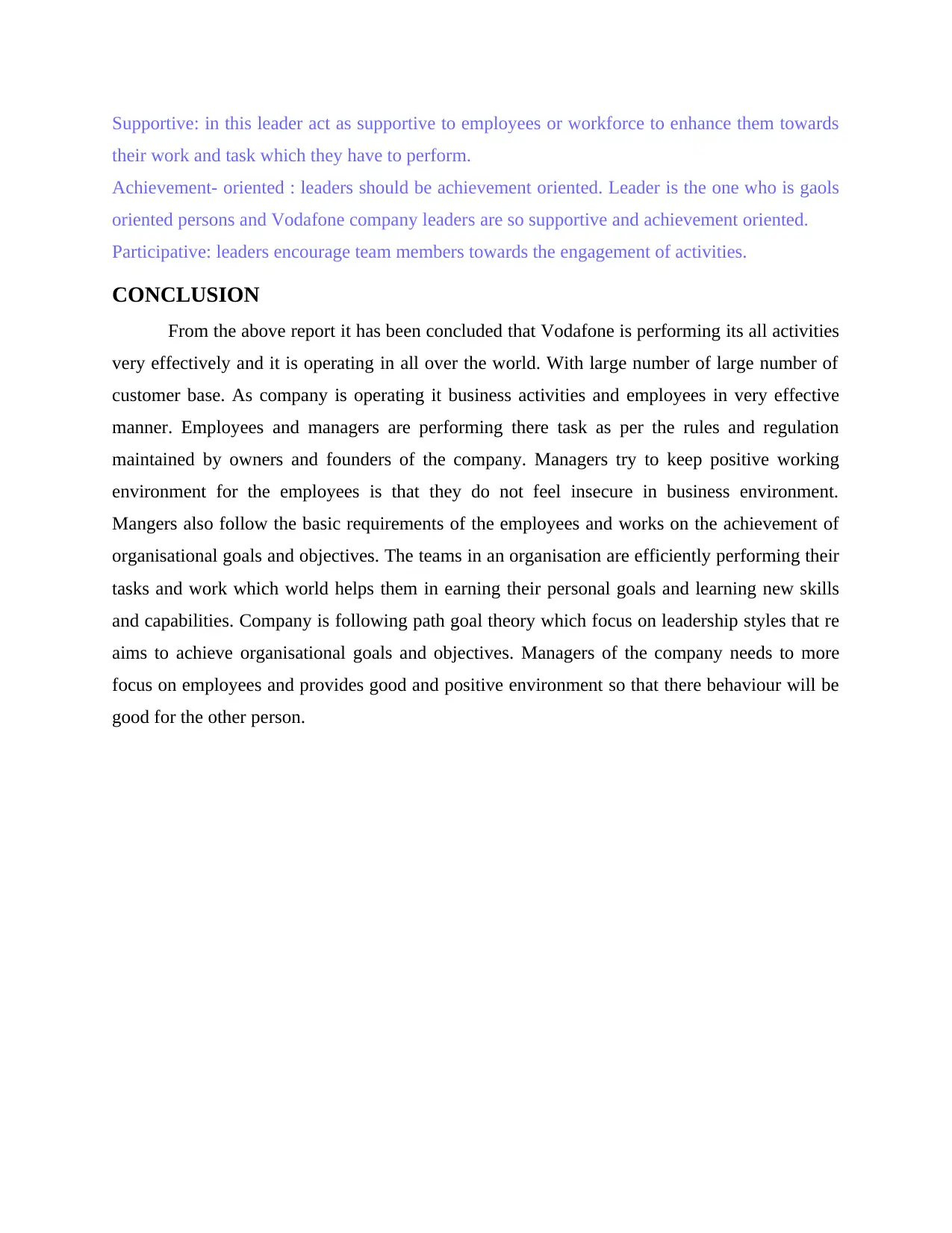
Supportive: in this leader act as supportive to employees or workforce to enhance them towards
their work and task which they have to perform.
Achievement- oriented : leaders should be achievement oriented. Leader is the one who is gaols
oriented persons and Vodafone company leaders are so supportive and achievement oriented.
Participative: leaders encourage team members towards the engagement of activities.
CONCLUSION
From the above report it has been concluded that Vodafone is performing its all activities
very effectively and it is operating in all over the world. With large number of large number of
customer base. As company is operating it business activities and employees in very effective
manner. Employees and managers are performing there task as per the rules and regulation
maintained by owners and founders of the company. Managers try to keep positive working
environment for the employees is that they do not feel insecure in business environment.
Mangers also follow the basic requirements of the employees and works on the achievement of
organisational goals and objectives. The teams in an organisation are efficiently performing their
tasks and work which world helps them in earning their personal goals and learning new skills
and capabilities. Company is following path goal theory which focus on leadership styles that re
aims to achieve organisational goals and objectives. Managers of the company needs to more
focus on employees and provides good and positive environment so that there behaviour will be
good for the other person.
their work and task which they have to perform.
Achievement- oriented : leaders should be achievement oriented. Leader is the one who is gaols
oriented persons and Vodafone company leaders are so supportive and achievement oriented.
Participative: leaders encourage team members towards the engagement of activities.
CONCLUSION
From the above report it has been concluded that Vodafone is performing its all activities
very effectively and it is operating in all over the world. With large number of large number of
customer base. As company is operating it business activities and employees in very effective
manner. Employees and managers are performing there task as per the rules and regulation
maintained by owners and founders of the company. Managers try to keep positive working
environment for the employees is that they do not feel insecure in business environment.
Mangers also follow the basic requirements of the employees and works on the achievement of
organisational goals and objectives. The teams in an organisation are efficiently performing their
tasks and work which world helps them in earning their personal goals and learning new skills
and capabilities. Company is following path goal theory which focus on leadership styles that re
aims to achieve organisational goals and objectives. Managers of the company needs to more
focus on employees and provides good and positive environment so that there behaviour will be
good for the other person.
⊘ This is a preview!⊘
Do you want full access?
Subscribe today to unlock all pages.

Trusted by 1+ million students worldwide
1 out of 14
Related Documents
Your All-in-One AI-Powered Toolkit for Academic Success.
+13062052269
info@desklib.com
Available 24*7 on WhatsApp / Email
![[object Object]](/_next/static/media/star-bottom.7253800d.svg)
Unlock your academic potential
Copyright © 2020–2025 A2Z Services. All Rights Reserved. Developed and managed by ZUCOL.




